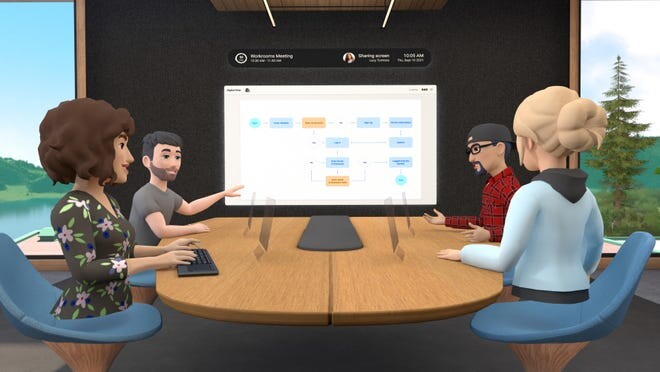‘#Internet’ is amongst the most commonly used word globally; an average person would use this word over 10 times every day. It’s because the word itself is an ecosystem, where we connect, communicate, collaborate or live our life. #Metaverse is another such word that represents a complete ecosystem; hence it would be a word that would be our life in years to come.
Let’s start with understanding this word “Metaverse”. The meaning of ‘Meta’ in Greek is ‘Beyond’ and ‘Verse’ is taken from ‘Universe’, so the literal translation of the word ‘Metaverse’ is ‘Beyond Universe’. This word starts getting to its real meaning when we compare statements issued by the most promising people of the digital industry in relation to their work in the space of #Metaverse:
“Right now, we are on the cusp of the next internet,” said Matthew Ball, managing partner of venture capital firm Epyllion Industries, in a February 2021 essay on his website.
Roblox founder and CEO David Baszucki tweeted a thank you to all who helped bring the platform “one step closer to fulfilling our vision of the #Metaverse.” Since then, Roblox has teamed up with skateboarding shoe company Vans to create Vans World, a virtual skateboarding park where players can dress up in fresh Vans gear and opened a limited Gucci Garden, where you can try and buy clothing and accessories for your virtual self. The platform, founded in 2004, houses scores of user-generated games, including role-playing offerings like Bloxburg and Brookhaven, where users can build homes, work and play out scenarios.
Tim Sweeney, CEO of the company that developed Fortnite game, has said, “It’s no secret that Epic is invested in building the metaverse.” It’s held concerts by the likes of Ariana Grande and Travis Scott, movie trailers and music debuts and even an “immersive” re-imagining of Martin Luther King Jr.’s 1963 historic “I Have A Dream” speech. And it’s developing photorealistic digital humans with its MetaHuman Creator, which could be how you customize your digital doppelganger in future open-world games. The online haven Nowhere has persistent and temporary virtual spaces – for public or private use – to hold concerts, festivals, reunions, and conferences. The Windmill Factory, the New York production company which began developing the platform more than a year ago, has done projects for Lady Gaga and Nine Inch Nails.

“The next platform and medium will be even more immersive and embodied internet where you’re in the experience, not just looking at it, and we call this the metaverse,” said Meta CEO Mark Zuckerberg last month after revealing the company’s rebranding. The tech giant formerly known as Facebook has already made significant investments in virtual reality, including the 2014 acquisition of Oculus. Meta envisions a virtual world where digital avatars connect through work, travel or entertainment using VR headsets. Zuckerberg has been bullish on the metaverse, believing it could replace the internet as we know it.
Mark Zuckerberg, the CEO of the newly named Meta (formerly Facebook), estimates it could take five to 10 years before the key features of the metaverse become mainstream. But aspects of the metaverse currently exist. Ultra-fast broadband speeds, virtual reality headsets and persistent always-on online worlds are already up and running, even though they may not be accessible to all.
Microsoft, the software giant already uses holograms and is developing mixed and extended reality (XR) applications with its Microsoft Mesh platform, which combine the real world with augmented reality and virtual reality. 2021, Microsoft showed off its plans for bringing mixed-reality including holograms and virtual avatars to Microsoft Teams in 2022. Also in the works for next year: explorable 3D virtual connected spaces for retail and workplaces. The U.S. Army is currently working with Microsoft on an augmented reality Hololens 2 headset for soldiers to train, rehearse and fight in. Beyond that, Xbox Live already connects millions of video game players across the globe, too.
#Internet was first developed only for military use and then opened up for public, this was done foreseeing the impact it could create on human race and the same is expected from #Metaverse. Let’s understand this ecosystem, given that the global leaders are already heavily invested in this.
‘Metaverse is a combination of multiple elements of technology, including virtual reality, augmented reality and video where users “live” within a digital universe. Supporters of the metaverse envision its users working, playing and staying connected with friends through everything from concerts and conferences to virtual trips around to the world.’
To a certain extent, talking about what “the metaverse” means is a bit like having a discussion about what “the internet” means in the 1970s. The building blocks of a new form of communication were in the process of being built, but no one could really know what the reality would look like. So while it was true, at the time, that “the internet” was coming, not every idea of what that would look like is true.
To help you get a sense of how vague and complex a term “the metaverse” can be, here’s an exercise to try: Mentally replace the phrase “the metaverse” in a sentence with “cyberspace.” Ninety percent of the time, the meaning won’t substantially change. That’s because the term doesn’t really refer to any one specific type of technology, but rather a broad shift in how we interact with technology. And it’s entirely possible that the term itself will eventually become just as antiquated, even as the specific technology it once described becomes commonplace. Right now, most platforms have virtual identities, avatars, and inventories that are tied to just one platform, but a #Metaverse might allow you to create a persona that you can take everywhere as easily as you can copy your profile picture from one social network to another.
Reference, Image & Video Credit:
https://en.wikipedia.org/wiki/Metaverse
https://www.wired.com/story/what-is-the-metaverse/
https://time.com/6116826/what-is-the-metaverse/

